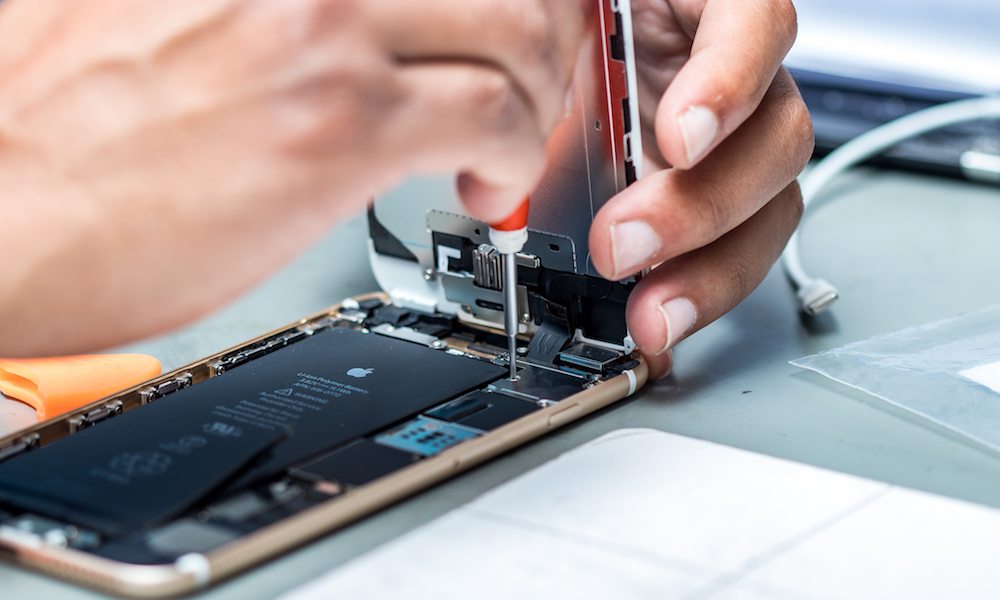Apple Still Fighting ‘Right to Repair’ Laws, Says It Doesn’t Want Users Hurting Themselves
 Credit: Apple
Credit: Apple
Toggle Dark Mode
In its latest fight against “Right to Repair” legislation, Apple claims that it’s primary interest is in trying to protect customers from hurting themselves, emphasizing that the issue is one of consumer safety rather than simply trying to force customers to use its own more expensive repair services, as proponents of the legislation have repeatedly suggested.
According to Motherboard, An Apple representative and a lobbyist for trade organization CompTIA have been privately meeting with legislators in California to try and get that state’s proposed “Right to Repair” legislation killed prior to hearings on the bill. Citing two sources within the California State Assembly, the report reveals that lobbyists brought an iPhone to meeting with members of the Privacy and Consumer Protection Committee to demonstrate how consumers attempting to fix their own iPhone could hurt themselves by puncturing the lithium-ion battery.
Apple has been making this argument, and variations of it, for at least two years now. Apple’s VP of Environment, Policy and Social Initiatives, Lisa Jackson, tried to make the point at TechCrunch Disrupt back in 2017 that iPhones aren’t designed to be repaired by end users, as the company focuses on creating products that are durable, rather than accessible, focusing on the longevity of its products for environmental reasons. While the two aren’t mutually exclusive, Jackson noted that she believes that it’s more important that Apple designs products to last without needing repairs at all than to compromise on longevity simply to make repairs more accessible.
Unfortunately, many proponents of “right to repair” legislation — which in most cases really just requires companies to make parts and repair manuals publicly available — feel that Apple’s stance doesn’t really hold up to scrutiny, particularly in light of the fact that the company still controls its network of Apple Authorized Service Providers and unilaterally sets the pricing for repairs.
Further, Apple has put an unusual amount of effort into lobbying against this legislation in various states, including Nebraska and New York, and outside of the U.S., Apple has been known to sue unauthorized repair shops, even though it doesn’t always win due to more consumer-friendly laws in other countries — the same types of laws that many U.S. states have been pushing at for a while now.
In its 2017 efforts, Apple tried to take an unusually alarmist approach, suggesting to Nebraska lawmakers that right to repair legislation would turn Nebraska into a “mecca for bad actors,” with hackers and criminals likely to flood into the state. The company’s efforts resulted in enough negative press coverage that Apple itself decided to go quiet, and instead rely on the lobbying efforts of CompTIA, an industry organization that it funds along with other tech giants like Microsoft and Samsung.
The more secretive in-person meetings were simply the latest salvo in more public efforts by CompTIA and 18 other related trade organizations to oppose the new legislation in a letter-writing campaign to members of the State Assembly’s Privacy and Consumer Protection Committee. In addition to CompTIA and its Apple connection, other industry groups involved represented the big wireless carriers and video game manufacturers.
While Apple’s approach seems to be focused on consumer safety, other lobbying groups have raised concerns about the availability of “proprietary guides and tools” empowering hackers with inside information, which could “harm not only the product owner but also everyone who shares their network.”
Of course, experts on the other side are calling out Apple and CompTIA for their hyperbole, saying that the warnings are “far overblown” as many people regularly replace batteries or cracked screens, and many smaller and independent repair companies regularly fix iPhones without incident, although they operate in much murkier territory when it comes to getting parts, since Apple of course won’t sell to anybody who isn’t an authorized partner. Right to repair legislation would likely change this, which is undoubtedly one of the reasons Apple is in opposition to the idea.
That said, it does seem that Apple is trying to open up more repair options for its customers, albeit in a controlled manner. Earlier this year, the company quietly approached several independent repair companies to offer an Apple Genuine Parts Repair program, equipping them with access to Apple parts and diagnostic tools so that they can provide a limited number of specific repairs.
While the program originally suggested that Apple is warming up to the idea of right to repair legislation, these latest efforts in California would seem to indicate that the company doesn’t quite want to see the floodgates opened, and may perhaps simply be extending an olive branch to try and demonstrate that fully open right-to-repair legislation isn’t as necessary as some proponents claim. Apple’s Genuine Parts Repair program would allow more repair shops to be able to effectively provide iPhone repairs, but would still ensure that Apple maintains fairly tight control of its repair manuals and parts supply chains, which is a far cry from what it would be required to do under right-to-repair legislation, essentially making its manuals and products available to any member of the public.
[The information provided in this article has NOT been confirmed by Apple and may be speculation. Provided details may not be factual. Take all rumors, tech or otherwise, with a grain of salt.]






